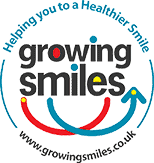* We are working on this page. Please call back or if you have a query contact use the Live chat button on the bottom right of the page, book an oral health coaching session or email us at [email protected]
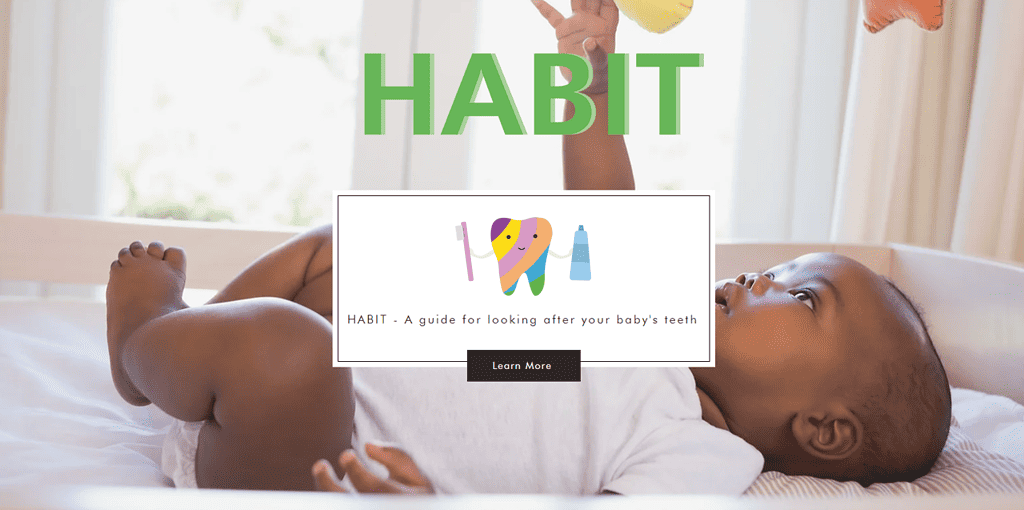
The University of Leeds Dental School has a great website supporting healthy habits for life. It aims to help every child grow up free from tooth decay. Have a look – lots of great advice, videos and links.
Inside the mouth – Tooth development and eruption. Teething. Developmental anomalies – colour, shape, size. Saliva, dribbling and teething. Early childhood tooth decay. Trauma – what to do when the unexpected happens.
Lifestyle, Health and Wellbeing – General health. Autism and sensory issues relating to oral health. Medicines, Child care, Trauma, Grinding, Dummy/digit sucking and its impact on shape of teeth and oral health.
Oral hygiene – Toothbrushing. Establishing oral care routines. Supporting oral hygiene. What to use – toothpaste and toothbrushes. Fluoride toothpaste – recommended fluoride level for this age. Flavour – mint and alternatives. Tips for brushing the teeth of a small child. When to clean teeth and why this matters.
Diet and Nutrition – Mealtimes. Snacks. Drinks. Bedtime food/drink. Sugar – free sugars, hidden sugars and what low sugar and sugar free mean. Sugar swaps. Fussy eaters. Allergies and special diets.
Professional dental care – Family dental visits. Preventive care – Fluoride and Fissure sealants. Managing anxiety with dental care.
Inside the mouth:
Tooth development and eruption
Baby Teeth Matter – they aren’t all replaced by permanent teeth until around 12 years of age.
First permanent teeth – when they erupt and where to look for them. Variations in eruption, shape, size and colour. Tooth decay – how to spot early signs by lifting the lip and looking inside. Developmental anomalies and poorly mineralised (formed) teeth.
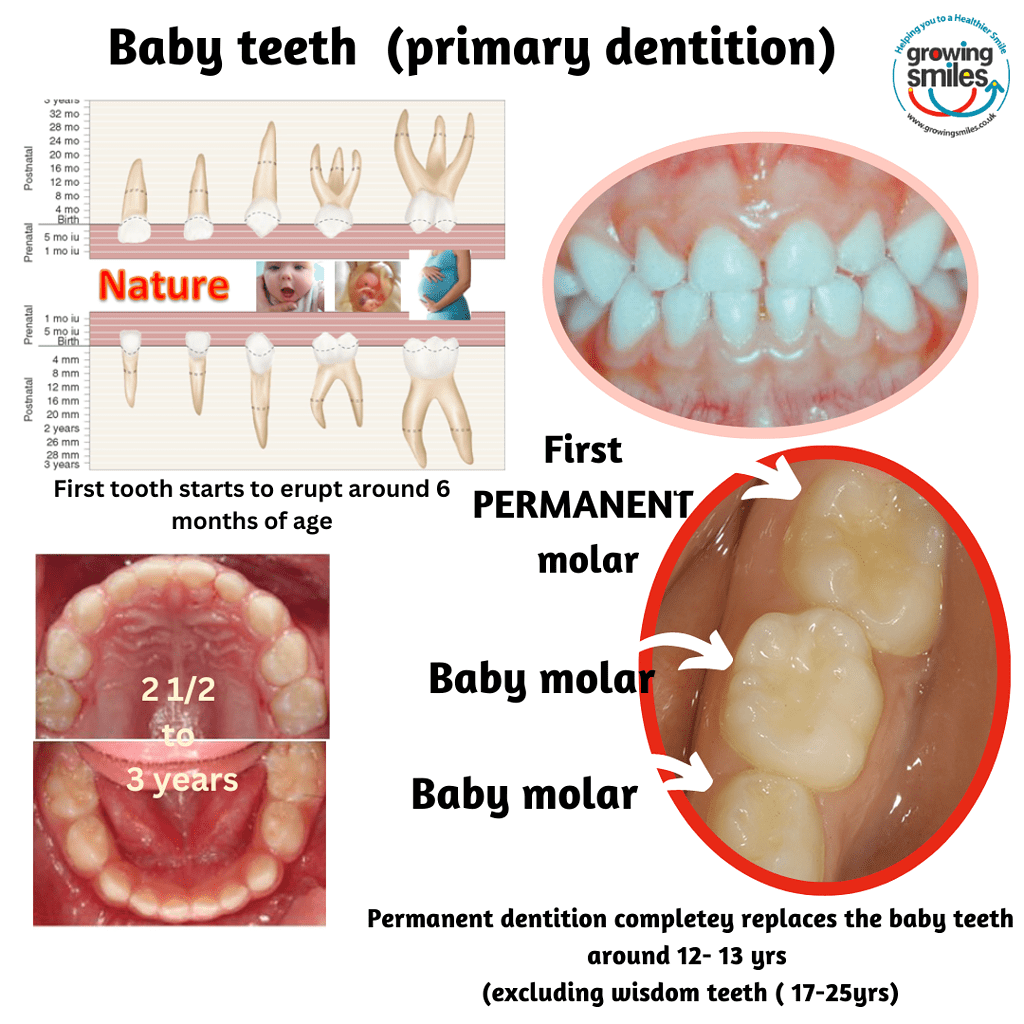
Usually the first baby tooth arrives around 6 months of age although occasionally a tooth is present at birth. By the time your little one is 2 1/2 to 3 years old they will have all 20 baby teeth. Ten on the top and ten on the bottom. The baby molars are not replaced by all their permanent successors until around 12/13 years of age. Look out for the first permanent molar erupting BEHIND all the baby molars around 6 years of age. Often before their first wobbly incisor at the front!
Generally the lower teeth erupt into the mouth before the upper but there is lot of variation.
Start cleaning as soon as the first tooth appears. Use a soft toothbrush and a smear of toothpaste with at least 1000ppm fluoride. Learn more about toothbrushing here.
Watch our video connecting baby milestones with their baby teeth erupting.
More videos about looking after baby teeth here.
Teething – learn more here.
Developmental anomalies
When things don’t quite go to plan. Shape, size, colour.
Both baby (primary/deciduous) and adult (permanent) teeth can be affected during their development. A range of factors can affect the number of teeth, their size and shape as well as how the actual tooth e.g. enamel, dentine forms. Genetics and environment both play a part in anomalies during the period of tooth development including from before birth.
Baby teeth start to form during pregnancy (around 6 weeks in utero), and while all the crowns (the part seen above the gum in the mouth) are completely formed for all baby teeth by around the first birthday, tooth roots are not complete until around 4 years of age. During this time lots of things can cause changes to how the teeth develop.
Permanent teeth start to develop around birth. The first permanent molars are usually the first permanent teeth to erupt at around the age of 6 years BEHIND all the baby molars. They are easily mistaken for a baby tooth as often they arrive before the first baby tooth falls out. Baby teeth are gradually replaced from around 6 years of age to about 12 years old – a time dental professionals refer to a mixed dentition – some baby and some permanent teeth. Baby molars aren’t replaced by their permanent successors until around 12 years- so it is important to look after ALL baby teeth.
What happens?
Some of us are born with missing teeth – think wisdom teeth. Some have extra or supernumerary teeth. Extra teeth are seen more often in the permanent teeth.
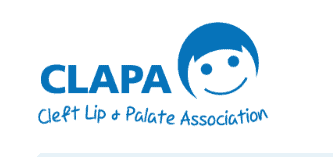
While it is more unusual for baby teeth to be missing, it does happen. Children with cleft lip or palate may have missing baby teeth. Recent research has shown there is a genetic component to cleft lip, and that some environmental factors such as smoking, stress, infections and malnutrition during pregnancy can also increase the risk of cleft lip.The UK cleft lip and palate association have great support and information which you can find here.
Missing teeth have been associated with multiple births, low birth weight and increased mothers age. There are are a number of genetic disorders which are related to multiple missing teeth and ‘small’ teeth including Down syndrome. It is easy to forget about oral health if you have a child with additional needs. It is important that all children have their teeth cleaned from their eruption and that they have their first dental visit by their first birthday.
Tooth wear
Grinding
The sound of teeth rubbing together is one that has put many parents nerves on edge. More accurately called bruxism which the international scientific community defines it as “repetitive activity of the jaw muscles characterized by clenching or grinding of the teeth and/or clenching or thrusting of the jaw”. It may occur during the day and/or at night. Generally there is little to be be concerned about If you notice your little one grinding but prolonged bruxing may cause a range of problems including tooth sensitivity, headaches, sleep disruption, tender jaw muscles and tooth wear. Night time bruxism can affect the quality of sleep and as with adult bruxing it may, amongst other things, be related to stress and anxiety e.g. new school or a new baby. Creating a calm and relaxing bedtime routine can help.
There are many factors that result in children grinding their teeth, and as with many other conditions with a range of causes, there is no exact treatment for its prevention and treatment. Babies who grind their teeth usually stop when all the baby teeth have erupted but if your child is continuing to grind when they start school (around 5 years old), or you are concerned, contact your dental team.
Reflux
Gastro-oesophageal reflux disease (GERD) is related to erosion of tooth surfaces. Once teeth erupt into the mouth a number of factors affect the risk of dental erosion developing. These include how long the reflux goes on, how often reflux occurs, the acidity (pH) and type of acid involved, and the quality and quantity of saliva in the mouth to help buffer and neutralise acids and reharden the tooth surfaces after reflux. It is important to seek medical advise to identify the cause of any reflux. Once teeth erupt into the mouth they are at risk of dental erosion from reflux or other sources of acid (see erosion below). Use an age appropriate fluoride toothpaste and consider a remineralising product suited to your child’s condition. Speak to your dental team for advise – your child should have their first dental check by their first birthday.
Erosion
Tooth decay
Tooth decay is the most common oral disease that affects children and young people, yet it is largely preventable. High intake of free sugars, inadequate exposure to fluoride and a lack of plaque removal by toothbrushing can lead to tooth decay, pain, tooth loss and infection (FDI March 2023).
“Available evidence indicates that breastfeeding up to 12 months of age is associated with a decreased risk of tooth decay and may offer some protection when compared with infant formula” PHE.
Tooth decay results from free* sugars in the mouth acting on the bacteria in the plaque biofilm that forms on the surface of teeth. The sugar is quickly turned into acid by plaque bacteria and these acids attack the tooth surface which in time, will cause a cavity. In the early stages of this decay process it is possible to ‘heal’ the damage. The key risk for cavities developing are how much and how often sugar is the mouth. The more often and longer sugar containing food/drink are in the mouth the more likely tooth decay/cavities will develop. Limiting sugar containing food/drinks to mealtimes only and and avoiding them before bedtime will reduce the risk of tooth decay.
- Free sugars are all sugars added to food/drink by the manufacturer, cook or consumer as well as the sugars naturally present in honey, syrups and fruit juices.
We all want the best for our children and that includes oral health. Too many children end up in hospital for extraction of many teeth under general anaesthetic. The oral health survey of 3 year olds in 2020 found that 11% had obvious tooth decay, with on average 3 teeth affected. Tooth decay is largely preventable – start the way you mean to go on. Children who have decay in baby teeth are more likely to get decay in permanent (adult) teeth.
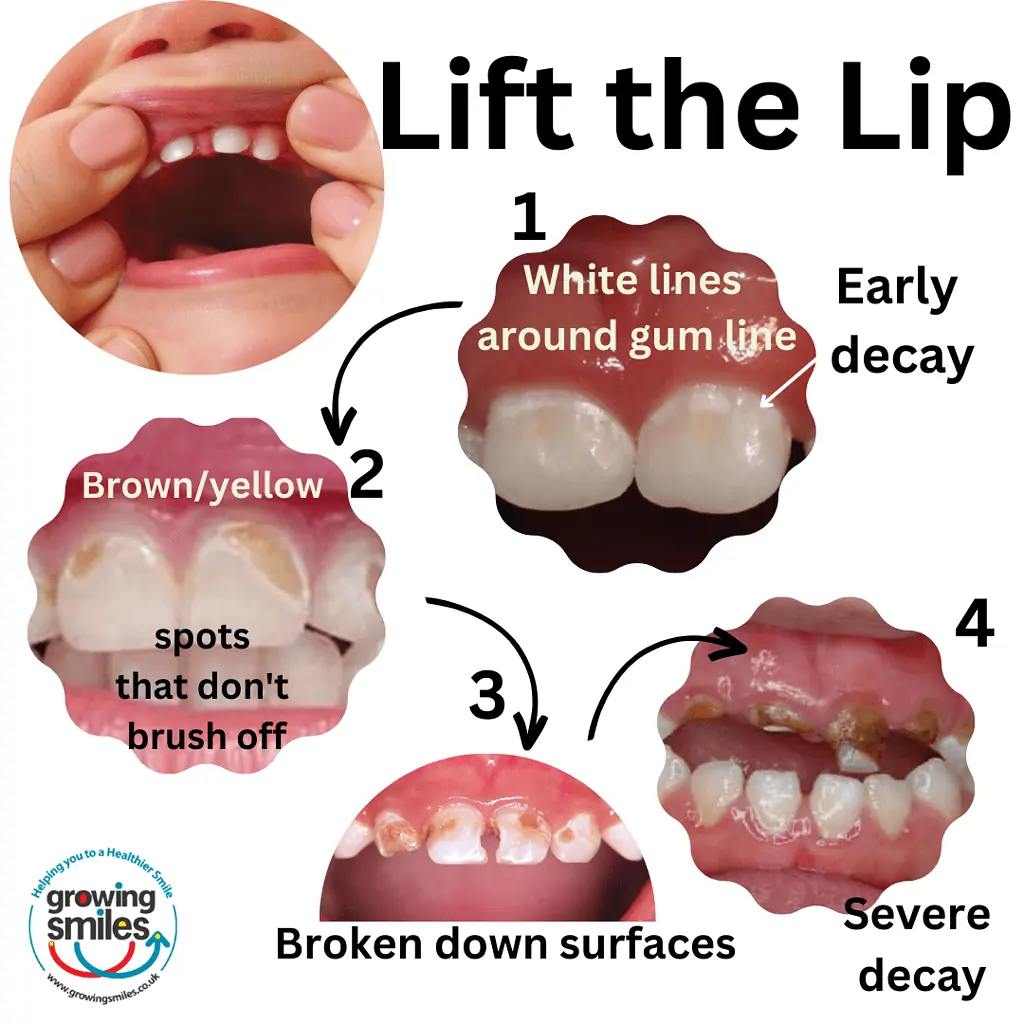
Early childhood tooth decay (also called bottle tooth decay and baby bottle decay) is the term given to a severe form of tooth decay (cavities/dental caries) which affects very young children (from birth to school age). It involves decay causing bacteria transferred to young children (usually from parents) act on free sugars in the diet causing ‘demineralisation’ of the tooth surfaces. It can progress very quickly once teeth have erupted into the mouth and can result in pain, poor sleep for children and parents, and hospital admission for tooth extraction. In the very early stages it can be reversed, so recognising the early signs and getting prompt professional care is important. Regularly check your baby’s teeth by ‘lifting the lip’ and looking at their teeth. It is recommended to ‘lift the lip’ once a month.
Lifestyle, Health and Well being
General health – Medications, Supplements, Allergies. Dummy/digit sucking. Sensory issues relating to oral health. Child care. Trauma.
Always ask for sugar free medicines. If this is possible try to give any sugary medicines at mealtimes and follow with water to aid clearance from around the teeth.

Dummies generally cause less problems than a thumb or finger sucking habit as a dummy is usually given up before the adult teeth start to come through around 6 years of age. Dummies should never be dipped in anything sweet (e.g. jam, honey) – this will cause tooth decay. Ready to ditch the dummy? Visit our friend and colleague, speech therapist Joanne Jones to find out how to.
Trauma – accidents happen. Growing Smiles team are all parents and grandparents – we’ve been there, done that and mopped up the tears – and teeth 🙁 Little people try to run before they can walk, tip off bicycles, chairs etc (they climb like they are scaling Everest!), or trip over abandoned toys. Accidents do happen but do you know what to do? Dental Trauma UK have you covered. At this age you are talking about a baby tooth. DO NOT TRY TO RE-INSERT A BABY TOOTH – no matter how tempting it might be. A permanent tooth is developing underneath and there is real potential to do more harm than good.
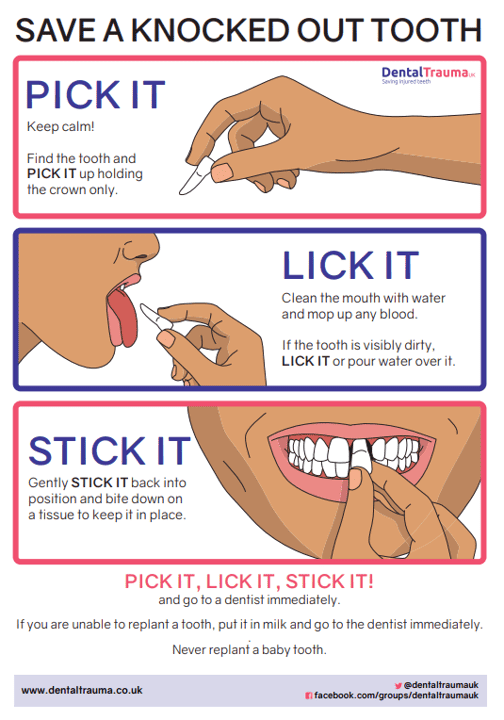
Oral hygiene
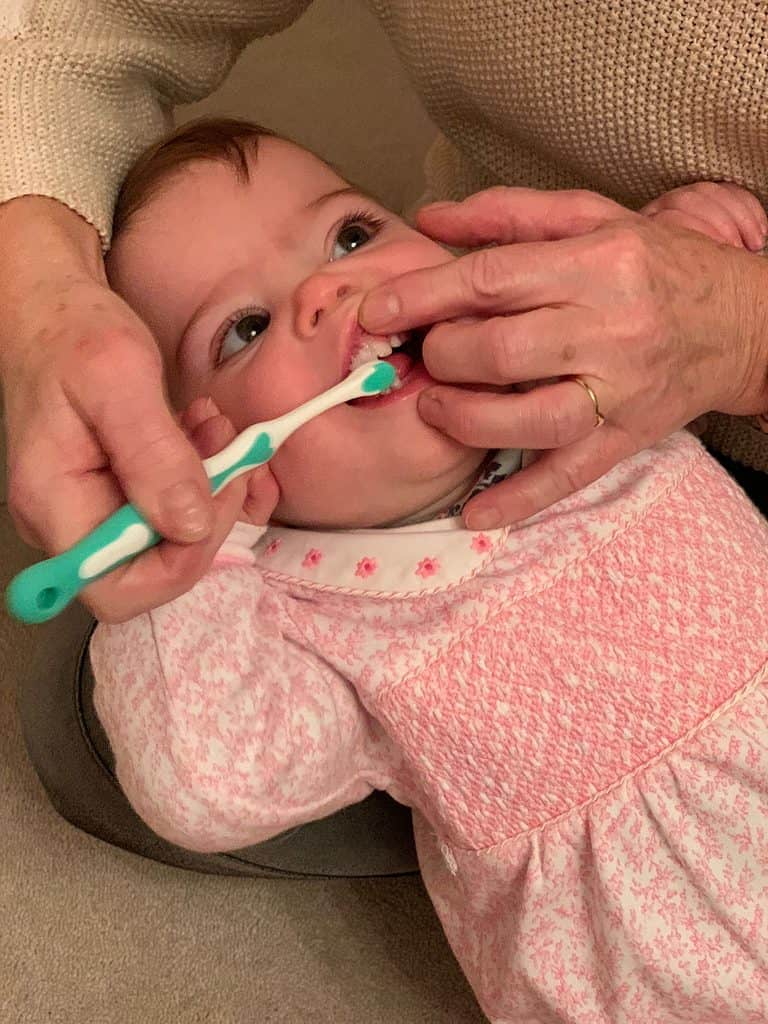
Oral hygiene using fluoride toothpaste supports oral health for life. Start good personal care routines early to help develop life long habits. Your children will copy you so let them see you practice daily mouth care. The physical action of brushing removes plaque biofilm, important for healthy gums, while the fluoride in toothpaste helps protect against tooth decay.
Start toothbrushing as soon as the first tooth appears. Young children will need an adult to brush their teeth for them and it is recommended that children are supervised when tooth brushing until at least the age of 7.
Brush before bedtime and one other time every day – usually in the morning.
Use a small toothbrush and toothpaste with at least 1000ppm fluoride. Use only a smear of toothpaste. Use the toothbrush dry and brush every surface of all teeth and around the gum line.
To prevent tooth decay applying fluoride around the teeth via toothpaste is the most important aspect of brushing. Fluoride helps prevent, control, and arrest tooth decay.
NEVER LET CHILDREN LICK OR EAT TOOTHPASTE FROM THE TUBE.
Family or standard fluoride toothpaste at 1350 – 1500 parts per million fluoride (ppmF) offers greater protection, although in very young children, where the ability to control swallowing is limited, a toothpaste containing a lower amount (at least 1,000 ppmF) can be used.
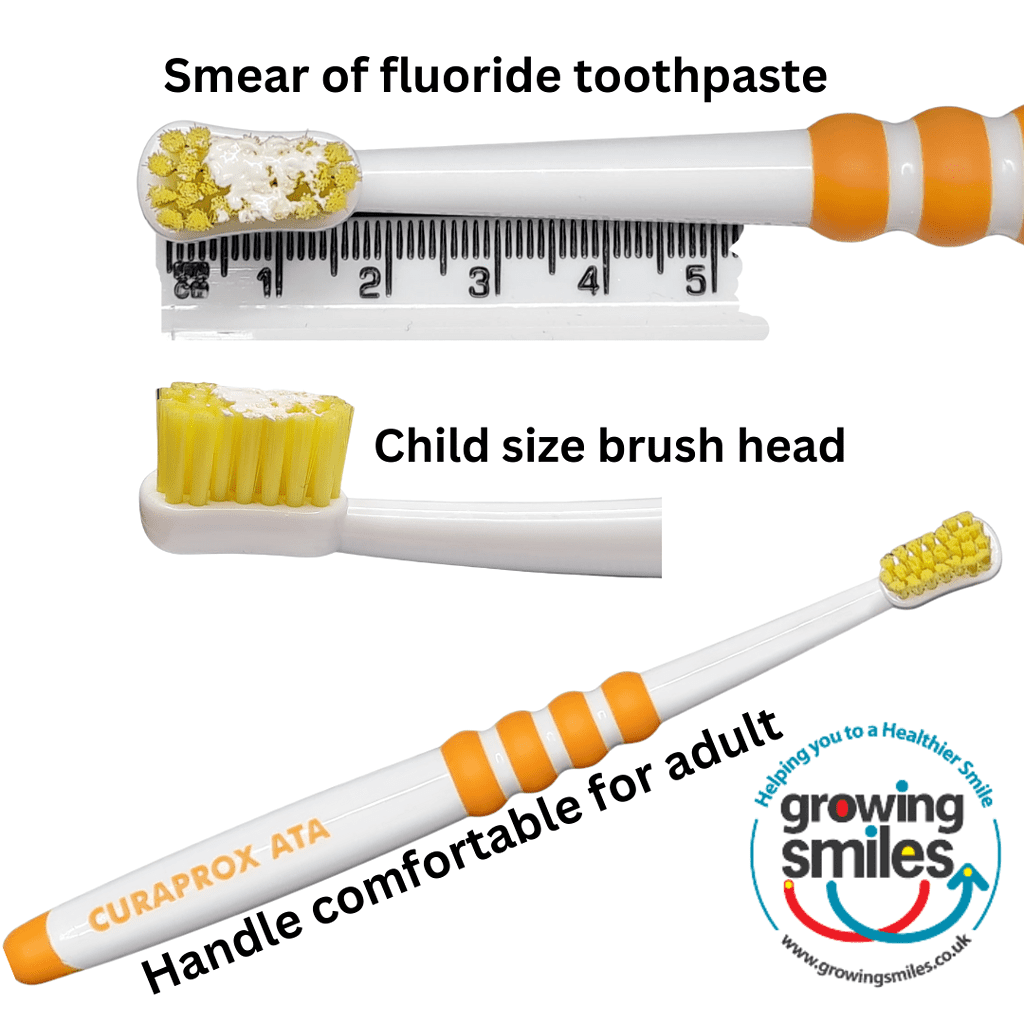
Brushing teeth of small wriggly children isn’t easy – but neither is washing their hair! One of those things that you know they will thank you for when they are older!
We’ve all been there and found there is no ‘perfect way’. Your child will copy you so start by setting a good example of brushing night and morning.
Distraction works well – singing, brushing in front of TV (there is no rule that says toothbrushing has to be done in the bathroom!). It’s whatever works for you. Persevere – it is worth it. Working from behind can help – think the way dental professionals work. check out our YouTube children’s playlist for some ‘demos’! 🙂
Diet and Nutrition
Weaning, Mealtimes v Snacks, Drinks, Fussy eaters, Allergies
- Breast/Bottle Feeding “Available evidence indicates that breastfeeding up to 12 months of age is associated with a decreased risk of tooth decay and may offer some protection when compared with infant formula” PHE.
- Weaning
- Snacks and Drinks
- Fussy eaters
- Allergies
Professional dental care
First dental visit by one year. Parents continuing oral health care
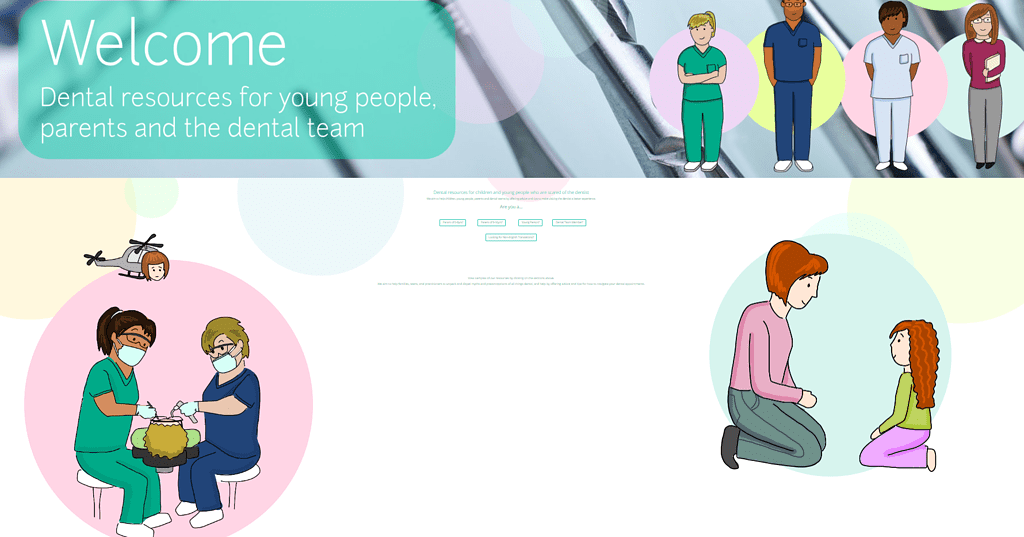
Worried about going to the dentist? We recommend visiting Living Life to the Full LLTTF which has advise and tips to make visiting the dentist a better experience.
